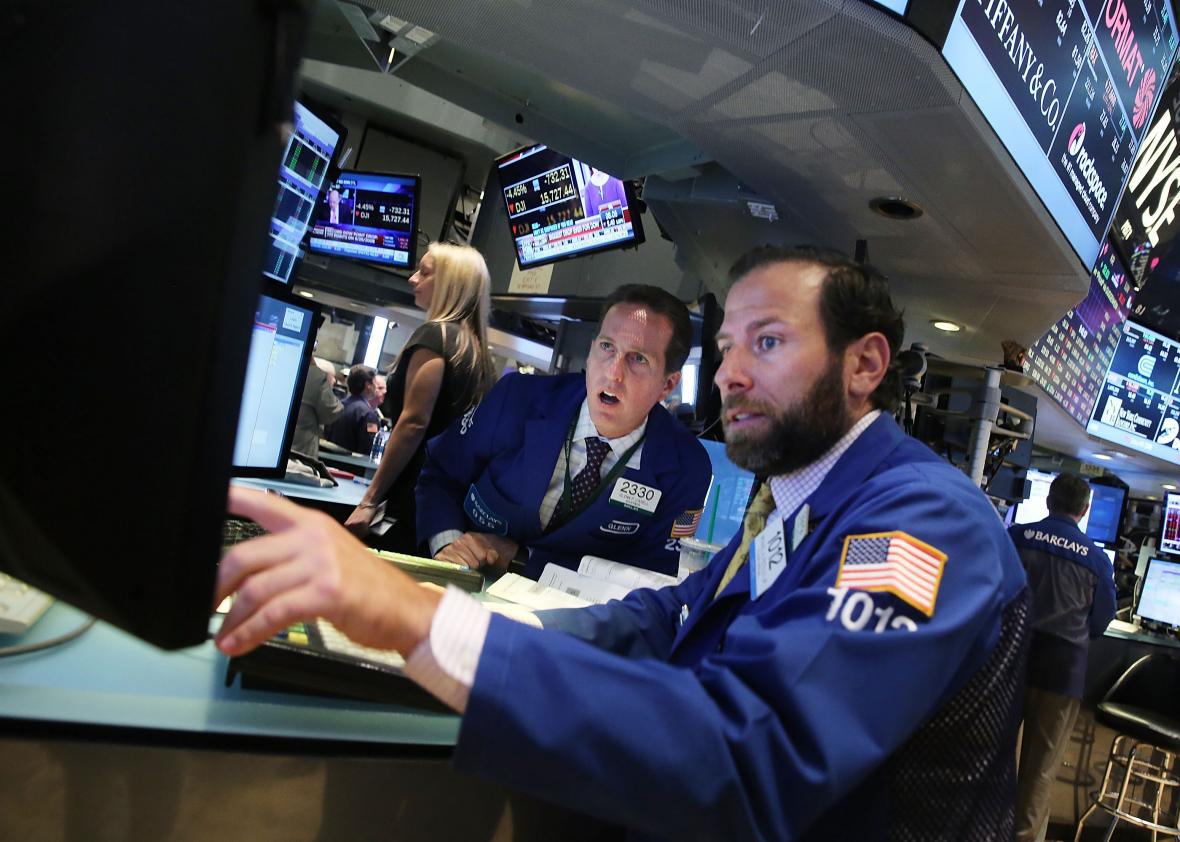Conventional wisdom says that the health of the stock market doesn’t matter much to the wider economy. Shares go up. Shares go down. But the swings of the S&P 500 don’t really influence things like growth rates or unemployment. On days like today, when global markets are getting slaughtered—JPMorgan’s trading desk said it was “hard to imagine an uglier morning”—that consensus is pretty comforting.
But not everybody agrees with it. UCLA economist Roger Farmer has been arguing for some time that the stock market does, in fact, sway the real economy. The man is generally something of a contrarian but is also respected for his “fearsome math skills and deep understanding of how modern [economic] models work,” as Bloomberg View’s Noah Smith has put it. Last year, the professor published a paper titled “The Stock Market Crash Really Did Cause the Great Recession.” On days like today, it’s pretty discomforting.
Using a statistical tool known as a Granger causality test, Farmer finds that changes in the stock market can predict changes in unemployment a quarter later. Using that relationship, he’s then able to build an economic model that very closely matches what transpired in the Great Recession. Of course, that doesn’t necessarily mean the plummeting share prices are what caused mass joblessness in 2008 and 2009. It’s possible the stock market was just reacting to other changes in the economy that happened to drive unemployment as well. But other data you might expect to help forecast the jobless rate—including “real GDP, real investment spending, the three month treasury bill rate, the CPI inflation rate and the spread of BAA bonds over ten year treasuries”—don’t have the same predictive relationship as stocks, Farmer finds. He concludes that the drop in the stock market alone could have driven unemployment far higher than it actually rose had it not been for the drastic interventions by the Federal Reserve.
What this leaves unanswered is how the stock market could crash the economy. Previously, Farmer has blamed “animal spirits”—which is just the term of art economists have adopted to describe what the rest of us call human emotion. The stock market plunges, businessmen get pessimistic, and they stop hiring or start laying off workers. During a recent appearance on Bloomberg’s What’d You Miss, however, he suggested “wealth effects” might be at play. That’s another fairly common-sense—but up-until-recently controversial—notion that when people feel richer they spend more, even if their wealth might only exist on paper. Likewise, when they feel poorer, they spend less. Here’s how Farmer put it:
If you’re, say, a 65-year-old couple, and your 401(k) drops by 10 percent and goes up again the next day, you’re not going to do very much. If your 401(k) drops by 10 perent and stays down for three or four months, you might decide not to take that cruise you were going to take, you might decide you’re not going to put as much money into your grandchild’s college fund. And you’re going to cut back on spending. And that I think is the channel. So confidence, in my view, drives the real economy.
Here’s where this story sort of falls apart for me. The most recent research suggests Americans’ spending habits just aren’t that sensitive to stock prices. When Nobel Prize winner Robert Shiller and his collaborators Karl Case and John Quigley last looked into the subject, they found “at best weak evidence of a link between stock market wealth and consumption.” Insofar as the link was real at all, it wasn’t very large. This makes sense when you consider that stock ownership is concentrated among relatively well-off households who can often keep spending like normal when the economy turns rocky. Middle-class Americans care a lot about home values, since that’s where their money is tied up, not the S&P 500.
But even if Farmer’s theory has some weak points, it’s at least interesting. Given how far markets have already dropped, does he think we’re headed for a downturn? “A lot depends on whether declines remain persistent or whether the U.S. economy comes back up again,” he told Bloomberg. In other words: who knows.
